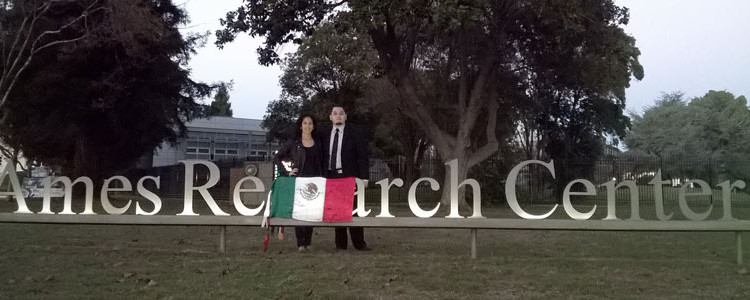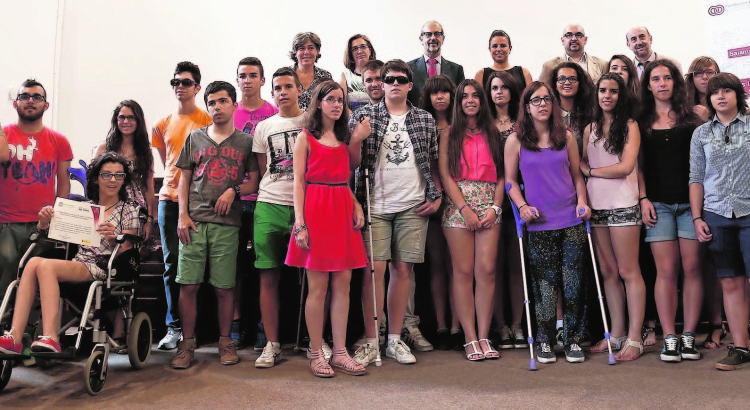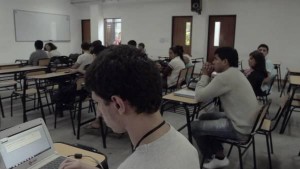Ciudad de México/ 5 de abril de 2016 /Autora: Tania Robles/ Fuente: (Agencia Informativa Conacyt) http://conacytprensa.mx/
Gracias a la convocatoria que la Agencia Espacial Mexicana (AEM) y la Administración Nacional de Aeronáutica y del Espacio (NASA, por sus siglas en inglés) lanzaron el año pasado, dos estudiantes mexicanos tuvieron la oportunidad de realizar una estancia de investigación en el Ames Research Center en California, Estados Unidos.
Durante quince semanas, Sonia Gamboa Vázquez y Mario Gurrola Morga, estudiantes de licenciatura, realizaron trabajo de investigación a la par con estudiantes de distintas nacionalidades y con expertos de la NASA.
Con esfuerzo y dedicación, todo es posible
Sonia Gamboa Vázquez es estudiante de octavo semestre de la carrera de ingeniería industrial en la Universidad Veracruzana, institución educativa que financió su estancia gracias a su gran desempeño y h abilidades.
abilidades.
Para la estudiante, esta experiencia cambió su punto de vista, «fue muy emocionante poder convivir con gente con todo tipo de estudios de todo el mundo, porque no tienen un tipo específico de persona que esté ahí en NASA siendo científico, ahí hay mucha diversidad y es un ambiente de multiculturalidad. Siento que eso es muy importante para todos los avances tecnológicos», platica para la AEM.
Su primer acercamiento a la NASA fue en 2014 cuando participó en una excursión educativa a Houston y en donde visitó el Johnson Space Center de NASA, «ahí me empecé a interesar en los temas del espacio y la tecnología de la NASA. Nunca pensé que pudiera ir a otro centro de investigación y menos estar en una estancia», comenta.
Su decisión de participar en la convocatoria que más tarde la llevaría a la NASA, fue a través del consejo de un amigo. Para esto, tuvo que escoger entre 25 temas tres que más llamaran su atención. Sonia tenía la mirada puesta en la temática de reciclaje de agua porque siempre ha sido de su interés el reciclaje y cuidado del medio ambiente. Para ser seleccionado en esta temática, en el perfil requerido figuraba contar con estudios de ingeniería, a lo que ella perfectamente acertaba.
Finalmente, fue seleccionada para la estancia y para trabajar en un proyecto en el tema de reciclaje de agua, en colaboración multidisciplinaria con compañeros estudiantes de otras partes del mundo con el fin de resolver el problema de la optimización del reciclaje del agua a través de ósmosis. Esta investigación tiene aplicaciones espaciales y terrestres.
Este proyecto tiene como fin aplicarlo en futuras misiones espaciales, “en la estación espacial internacional tienen su sistema de reciclaje de agua pero lo que se busca es hacer un sistema más ligero y eficiente para que en misiones largas no falle el sistema, que sea seguro y compacto. Entonces en lo que yo participé fue en optimizar el reciclaje por el proceso de ósmosis; probamos diferentes membranas para esto”, explica.
Sonia Gamboa continuará su carrera en México y, al concluirla, pretende realizar su posgrado en ingeniería mecánica en Estados Unidos. “Esta experiencia hizo que me interesara más por aspectos mecánicos para diversificar mi conocimiento”.
La estudiante veracruzana que gusta de actividades comunes como bailar danzón, correr con sus mascotas, convivir con sus amigos, demuestra que los sueños no son imposibles de alcanzar, pues para ella el trabajo constante abre caminos, y esta experiencia la ha hecho madurar y crecer personal e intelectualmente.
Oportunidades sí hay, solo hay que buscarlas
Mario Gurrola M orga, con poco más de dos décadas de vida, también visitó y realizó una estancia de investigación en el Ames Research Center. Él es estudiante de octavo semestre en ingeniería en sistemas computacionales en el Instituto Tecnológico Superior de Zapopan en Jalisco.
orga, con poco más de dos décadas de vida, también visitó y realizó una estancia de investigación en el Ames Research Center. Él es estudiante de octavo semestre en ingeniería en sistemas computacionales en el Instituto Tecnológico Superior de Zapopan en Jalisco.
No fue sino por medio de redes sociales que Gurrola se enteró de la oportunidad y, sin dudarlo, participó. Debido a que el costo de la estancia ascendía a cientos de pesos, Mario y su universidad buscaron patrocinio por otros medios, a lo que el gobierno del estado de Jalisco apoyó a que el destacado estudiante pudiera concretar esta gran oportunidad. “México está muy concentrado en la parte de manufactura pero nos falta involucrarnos más con la investigación y qué mejor que aprender de los que ya tienen todo establecido. Es una muy buena oportunidad”, comenta.
El proyecto de investigación en que participó estuvo basado en el análisis de información estadístico. “Nosotros intentábamos predecir el comportamiento de un sistema inteligente, que en este caso era un edificio. Por ejemplo, si queríamos controlar la temperatura, debíamos conocer la humedad y otros aspectos”, explica.
Para esto, cuenta que necesitó de muchos conocimientos matemáticos que tuvo que volver a aprender en el camino, o bien conocer desde cero. El trabajo que realizó se trató de investigación formal y del más alto nivel acompañado de investigadores expertos de la NASA.
Su trabajo está centrado en un edificio inteligente de la NASA, el Sustainability Base, “la NASA no solo realiza investigación del espacio, sino de todos los ámbitos. Luego lo aplican al ámbito aeroespacial”, agrega.
Su participación en el Sustainability Base es importante puesto que las características inteligentes de este edificio son un antecedente para lo que se pretende sea una base lunar habitable. “Esto me cambió la perspectiva y ahora tengo ganas de involucrarme en el terreno aeroespacial”, dice.
Una vez que concluya su licenciatura este año, tiene como objetivo estudiar la maestría en el área de la inteligencia artificial en una universidad en Japón.
Gracias a esta estancia, señala que tuvo un aprendizaje sobre el trabajo en equipo y la convivencia con otras culturas, pues en la estancia también había estudiantes de distintos continentes.
Para los estudiantes interesados en este tipo de convocatorias, Mario concluye y les aconseja «que es muy importante estudiar inglés, tener conocimientos del área en la que se busca participar y estudiar mucho».
Fuente de la Noticia y las Fotos:
http://conacytprensa.mx/index.php/sociedad/personajes/6392-mexicanos-desarrollan-investigacion-en-la-nasa


 abilidades.
abilidades. orga, con poco más de dos décadas de vida, también visitó y realizó una estancia de investigación en el Ames Research Center. Él es estudiante de octavo semestre en ingeniería en sistemas computacionales en el Instituto Tecnológico Superior de Zapopan en Jalisco.
orga, con poco más de dos décadas de vida, también visitó y realizó una estancia de investigación en el Ames Research Center. Él es estudiante de octavo semestre en ingeniería en sistemas computacionales en el Instituto Tecnológico Superior de Zapopan en Jalisco.
 «En la integración universitaria el desafío es permitir que la persona que logró transitar por la primaria y secundaria pueda desarrollarse también en el ámbito universitario. La discapacidad es la historia de las barreras que se le imponen a una persona, que tienen que reducirse al mínimo, para que se encuentre con el menor número posible de obstáculos», afirma Mariela Galeazzi, coordinadora del área de discapacidad y derechos humanos de ACIJ (Asociación Civil por la Igualdad y la Justicia).
«En la integración universitaria el desafío es permitir que la persona que logró transitar por la primaria y secundaria pueda desarrollarse también en el ámbito universitario. La discapacidad es la historia de las barreras que se le imponen a una persona, que tienen que reducirse al mínimo, para que se encuentre con el menor número posible de obstáculos», afirma Mariela Galeazzi, coordinadora del área de discapacidad y derechos humanos de ACIJ (Asociación Civil por la Igualdad y la Justicia).









 Users Today : 92
Users Today : 92 Total Users : 35461173
Total Users : 35461173 Views Today : 232
Views Today : 232 Total views : 3421064
Total views : 3421064